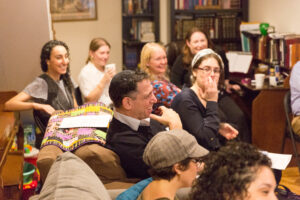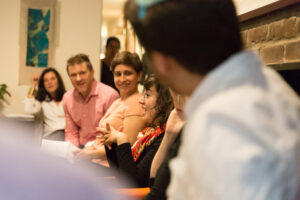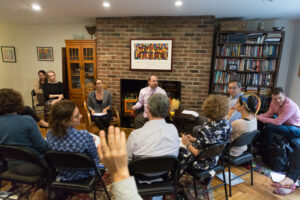Back in 2016, we piloted Salons to harness experts across fields as diverse as engineering, literature, philosophy, and business to think through the pressing concerns voiced by our rabbis, educators, and young adults.
Here’s what you can learn from Assembly Salons:
First, conversations can be catalytic if they are curated thoughtfully. In Jewish communal work we often try to advance an agenda by making a slide deck of relevant data and presenting it to an important group of people who have the power to make things happen through their organizations or with their dollars. The assumption is that if people know the relevant data, they will make rational choices to invest their time and money wisely. So, for instance, if we are talking about the need for more and better rabbis in the future, we might show the findings of a study to foundations and communal leaders and hope they fashion policies in response.

In our Salons we experimented with a different approach. We took an old problem, like the need for more and better rabbis, and tried to present it differently, gathering people around a single idea—one at the heart of our projects—and curating the conversation so they might inspire each other and capture one another’s imagination.
Our goal was to convene an eclectic group of 30-40 participants from a wide range of backgrounds — artists, funders, scholars, practitioners, lay leaders — to have an evocative and inspiring conversation. We would meet in a beautiful, offsite home, striving for the ambiance of a great dinner party or shabbat table, with good food and drink and thoughtful decor.
Second, employing a variety of conversational modalities enables a diversity of entrypoints and more meaningful participation. At these Salons, we invited people to share writing, speak frontally, engage in public conversations, and explore strategic questions in small groups.

For example, in a Salon on “The Experience of Conversion,” we opened a conversation among our Base rabbis and others who perform conversions, alongside converts themselves. After a robust discussion about the user-experience of this process, we invited a scholar, Rabbi Jeffrey Fox, to present a commissioned paper on the theoretical and halachic (Jewish legal) implications of “Jewish identity on a spectrum.” Following an interview about this theoretical framework, attendees broke into smaller group conversations around Theory, Ritual, and Structure, led by various innovators outside of our organization.
Third, our Jewish communal work is deeper when we imagine a virtuous cycle of Ideas and Action. Importantly, we felt that talking to one another was not about transmitting content alone, but that these Salon gatherings could be the basis for unearthing a deeper, more well-rounded understanding of the challenge or question at hand.
For example, in the case of our Salon on the Experience of Conversion, our Base rabbis had already developed a robust conversion program in New York City to meet the demand of their young adult community. Once that project had already been in motion for a year, they identified a number of strategic questions emerging from their work. We convened a Salon determined to better probe these questions — and this resulted in dozens of new, surprising ideas, emergent research directions, and a renewed creative vitality in our project.

Following this Salon, the Maimonides Fund awarded us a grant in Winter 2017 to conduct field research into the experience of conversion — conducting focus groups with converts, family member of converts, and rabbis who performed conversions. Farther down the line, this research continued to inform several projects built by our team over the next several years, including a nascent initiative called Sojourners.
These days, our team helps communities convene and curate their own Salons, to bring new life into existing projects, or to bring people together around big ideas and strategic questions.
What is an area of your work that could benefit from a wider research lens or a more diverse community conversation? Let’s talk about it together.